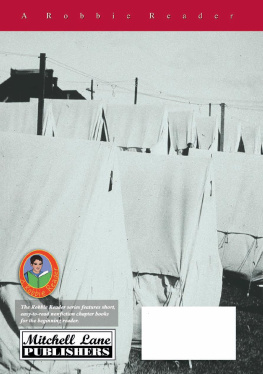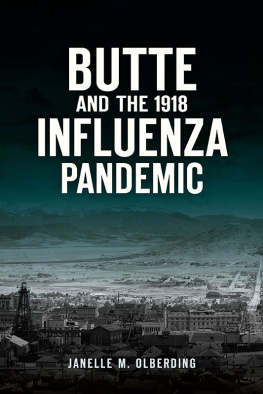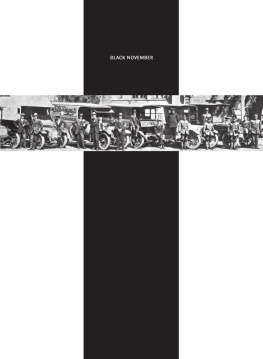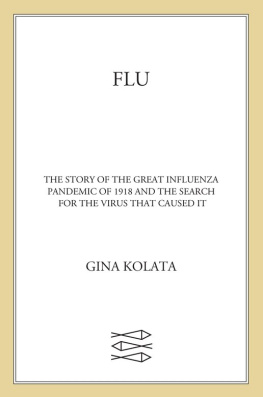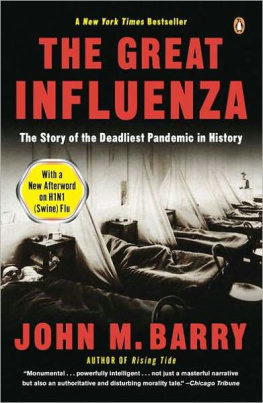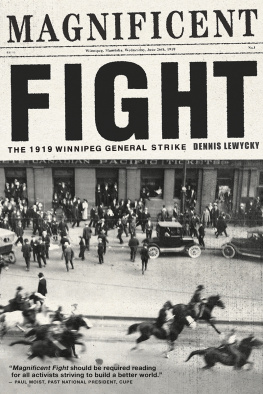INFLUENZA 1918:
DISEASE, DEATH, AND STRUGGLE IN WINNIPEG
The influenza pandemic of 191819 killed as many as fifty million people worldwide and affected the vast majority of Canadians. Yet the pandemic, which came and left in one season, never to recur in any significant way, has remained difficult to interpret. What did it mean to live through and beyond this brief, terrible episode, and what were its long-term effects?
Influenza 1918 uses Winnipeg as a case study to show how disease articulated and helped to redefine boundaries of social difference. Esyllt W. Jones examines the impact of the pandemic in the fragmented communities within the city, including its role in the eruption of the largest labour confrontation in Canadian history, the Winnipeg General Strike of 1919. Arguing that labour historians have largely ignored the impact of infectious disease upon the working class, Jones draws on a wide range of primary sources including mothers allowance and orphanage case files in order to trace the pandemics effect on the family, the public health infrastructure, and other social institutions. This study brings into focus the interrelationships between epidemic disease and working-class, gender, labour, and ethnic history in Canada.
Influenza 1918 concludes that social conflict is not an inevitable outcome of epidemics, but rather of inequality and public failure to fully engage all members of the community in the fight against disease.
(Studies in Gender and History)
ESYLLT W. JONES is an assistant professor in the Department of History at the University of Manitoba.
STUDIES IN GENDER AND HISTORY
General editors: Franca Iacovetta and Karen Dubinsky
INFLUENZA 1918
Disease, Death, and Struggle in Winnipeg
Esyllt W. Jones

University of Toronto Press Incorporated 2007
Toronto Buffalo London
Printed in Canada
ISBN 978-0-8020-9197-0 (cloth)
ISBN 978-0-8020-9439-1 (paper)

Printed on acid-free paper
Library and Archives Canada Cataloguing in Publication
Jones, Esyllt Wynne, 1964
Influenza 1918 : disease, death, and struggle in Winnipeg / Esyllt W. Jones
Includes bibliographical references and index.
ISBN 978-0-8020-9197-0 (bound)
ISBN 978-0-8020-9439-1 (pbk.)
1. Influenza Epidemic, 19181919 Manitoba Winnipeg.
2. Winnipeg (Man.) Social conditions 20th century. I. Title.
RC150.55.C32W55 2007 614.51809712743 C2007-903909-X
University of Toronto Press acknowledges the financial assistance to its publishing program of the Canada Council for the Arts and the Ontario Arts Council.
This book has been published with the help of a grant from the Canadian Federation for the Humanities and Social Sciences, through the Aid to Scholarly Publications Programme, using funds provided by the Social Sciences and Humanities Research Council of Canada.
University of Toronto Press acknowledges the financial support for its publishing activities of the Government of Canada through the Book Publishing Industry Development Program (BPIDP).
Contents
Acknowledgments
I wish to express my gratitude first, and above all, to the source of my greatest support in daily life and in deciphering the big questions: my partner, Todd Scarth, and my two children, Dylan and Owen. Todd calls us a heterodox family. To me, we are just the way I like it. This book is for the boys in my life.
My mother gave me a generous financial gift at the beginning of my doctoral work, which made it possible for me as a single mother to take the leap. I thank her and my father, who as Welsh immigrants taught me about adapting, longing, and struggling. My father died when I was in my mid-twenties; I think of him always.
Winnipeg is an enormously rich place to live and work, and so I have enjoyed the support of many friends, colleagues, and those I call family. Deirdre Tomkins and Donne Flanagan and their two boys, Callum and Kieran, my north end then south end compatriots: cariadus. Dianna Scarth has been a giving mentor and a loving grandmother, and Todds entire family has made me welcome. Thanks to Adele Perry and Peter Ives, Theo (Lu-lu), and Nell for bowling, pizza man pizza, and reality checks on parenting toddlers. Liv Valmestad, Christine Fellows, Alicia Smith, and Alissa York are good friends. Especially precious are my intellectual and publishing comrades at Arbeiter Ring Publishing, Roewan Crowe and John K. Samson (and Todd and Peter).
This city has some great historians, and I want to thank in particular Gerald Friesen, Tamara Myers (we miss you), and James Hanley. Mark Gabbert and Peter Bailey taught me, in their very different ways, how a historian thinks about class. In my last years as a graduate student, the history department at the University of Manitoba gained some new talent, and I benefited enormously from their energy: Jarvis Brownlie, Tina Chen, David Churchill, Roisin Cossar, Julie Guard (Labour Studies), and Greg Smith. The department is now my permanent home, and I am very happy about that.
I owe a special debt to Doug Smith, who first sent me into the archives, and who is the first person I call when I want to know something about Winnipeg labour and left history. I also have some economists to thank: John Loxley for long-time support, and Robert Chernomas, who first drew my attention to the work of Evan Stark. Others who have helped in one way or another include Jim Blanchard, Chris Dooley, Magda Fahrni, Desmond Fitzgibbon, Evelyn Forget, Geoffrey Hudson, Mark Osborne Humphries, Linda Kealey, Mary Kinnear, Alana Lajoie-OMalley, Marion McKay, Linda Quiney, Mercedes Steedman, and finally Naomi Rogers, who lent her support and cogent criticism to my doctoral thesis.
I worked on my manuscript during my time as a post-doctoral researcher at the Institute of Historical Research, University of London, and I want to thank Pat Thane, my supervisor, for a glimpse of life beyond this project. In 20056, I enjoyed a postdoctoral fellowship at the University of Winnipeg. I have been fortunate enough to receive financial support from the Social Sciences and Humanities Research Council and Associated Medical Services as both a doctoral and postdoctoral scholar, without which this book would never have been completed.
Like all historians, I depend on the expertise of archivists. I wish to thank the staff at the Provincial Archives of Manitoba, the Legislative Library, the Jewish Heritage Centre, and the City of Winnipeg Archives for their assistance.
The series editors, Karen Dubinsky and Franca Iacovetta, gave those things that cannot be overrated: encouragement and concrete suggestions for revision. Thank you, Franca, for going through my second draft with me chapter by chapter. Its a much better book for that. Mona Gleason gave fantastic help with my most troublesome chapter. My readers gave excellent advice. Jill McConkey and Barbara Tessman at University of Toronto Press, of that army of brilliant, efficient, and under-recognized women at the heart of the Canadian publishing industry, ably shepherded me through the publication process and put up with my annoying authorisms. Andy Carroll did a superb job copy-editing the manuscript. Leslie Cowan ably proofread it, and Noeline Bridge prepared the index. Thank you to W.J. Phillips, who gave permission to use his grandfathers art on the cover, which Mike Carroll beautifully designed.
I left a job in the labour movement to begin my doctorate. But it was as a part of labour that I first thought I might want to become a historian.


